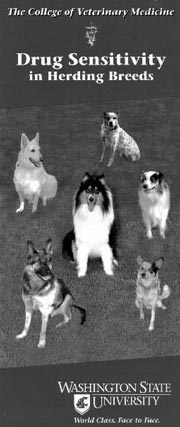MDR1 Information Article
Drug Sensitivity in Herding Breeds
by Dea Freiheit
Download a printable version of this article.
Collies and other herding breeds are highly sensitive to certain drugs. In fact, normal doses of these drugs can be fatal for certain dogs. Researchers in the Veterinary Clinical Pharmacology Laboratory at Washington State University discovered the cause of this sensitivity.
Drug sensitivities result from a mutation in the multi-drug resistance gene (MDR1). This gene encodes a protein, P-glycoprotein that is responsible for pumping many drugs and other toxins out of the brain. Dogs with the mutant gene cannot pump some drugs out of the brain as a normal dog would, which may result in abnormal neurologic signs. The result may be an illness requiring an extended hospital stay - or even death.
Drugs that have been documented to cause problems in dogs with the MDR1 mutation include:
- Acepromazine (tranquilizer and pre-anesthetic agent). In dogs with the MDR1 mutation, acepromazine tends to cause more profound and prolonged sedation.
- Emodepside (Profender®)-is a deworming drug approved for use in cats only in the U.S., but is approved for use in dogs in some other countries. Use of this drug in dogs with the MDR1 mutation has resulted in neurological toxicity.
- Erythromycin. Erythromycin may cause neurological signs in dogs with the MDR1 mutation.
- Ivermectin (antiparasitic agent). While the dose of ivermectin used to prevent heartworm infection is SAFE in dogs with the mutation (6 micrograms per kilogram), higher doses, such as those used for treating mange (300-600 micrograms per kilogram) will cause neurological toxicity in dogs with the MDR1 mutation.
- Loperamide (ImodiumTM; antidiarrheal agent). At doses used to treat diarrhea, this drug will cause neurological toxicity in dogs with the MDR1 mutation. This drug should be avoided in all dogs with the MDR1 mutation.
- Selamectin, milbemycin, and moxidectin (antaparasitic agents). Similar to ivermectin, these drugs are safe in dogs with the mutation if used for heartworm prevention at the manufacturer's recommended dose.
- Vincristine, Vinblastine, Doxorubicin (chemotherapy agents). Based on some published and ongoing research, it appears that dogs with the MDR1 mutation are more sensitive to these drugs with regard to their likelihood of having an adverse drug reaction.
Drugs that may be pumped out by the protein that the MDR1 is responsible for producing, but appear to be safely tolerated by dogs with the MDR1 mutation:<
- Morphine, buprenorphine, fentanyl (opioid analgesics or pain medications).
The following drugs have been reported to be pumped by P-glycoprotein (the protein encoded by the MDR1) in humans, but there is currently no data stating whether they are or are not pumped by canine P-glycoprotein. Therefore we suggest using caution when administering these drugs to dogs with the MDR1 mutation.
- Domperidone
- Etoposide
- Mitoxantrone
- Ondansetron
- Paclitaxel
- Rifampicin
Approximately 75% of Collies in the united States have the mutant MDR1 gene. This holds true in France and Australia also, so it is likely that most Collies worldwide have this mutation. The MDR1 mutation has also been found in Shetland Sheepdogs, Australian Shepherds, Old English Sheepdogs, German Shepherds, Long-haired whippets, Silken Windhounds and a variety of mixed breed dogs.<
The only way to know if an individual dog has the multidrug sensitivity is to check its DNA for the mutant MDR1 gene. A simple test has recently been developed at Washington State University to screen for the presence of the mutant MDR1 gene. Instead of withholding necessary drug treatments, the MDR1 test will determine if a dog is normal, in which case these drugs can be safely administered. Or if the dog is found to have this sensitivity (has the mutant MDR1 gene), then an alternative treatment must be used.
Testing is as easy as 1-2-3!
OESCA recommends testing for the MDR1 mutation through Washington State University. The WSU lab is only one of two in the U.S. accepted by OFA for this particular test.
The MDR1 test may be completed with a simple cheek swab, or a blood sample submitted through your veterinarian. Either test may be ordered online through WSU's laboratory: vcpl.vetmed.wsu.edu for a cost of $60-70 (credit card or check). Multi-dog discounts may apply for 5+ dogs.
As with all health testing, OESCA encourages everyone to record their MDR1 results with the OFA for ongoing study and incidence tracking of genetic disorders in our breed. The OFA form to submit results may be downloaded HERE.




